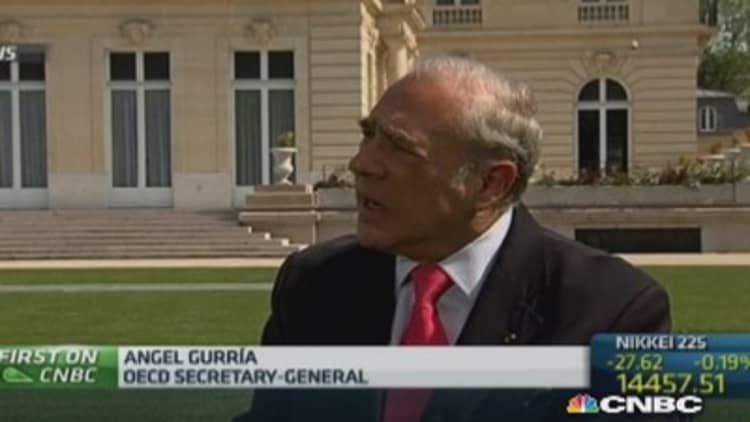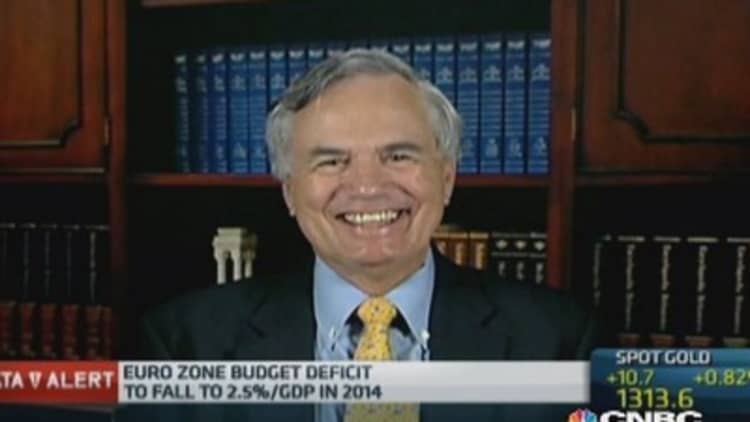Complacency by policymakers and a "crisis of trust" in politicians, banks and multinationals are the biggest risks to the global economy this year, the head of the Organisation for Economic Co-operation and Development (OECD) told CNBC.
The warning from OECD Secretary-General Angel Gurria came as the 34-country organization released its annual economic outlook, trimming expectations for global growth for this year and predicting "moderate" economic and trade expansion.
It also forecast a slowdown in the Chinese economy, warned of only modest declines in unemployment and stressed that tighter financial and credit conditions would weigh on emerging economies.
The OECD cut its global growth expectations from its November outlook from 3.6 percent to 3.4 percent for 2014, although it kept its forecast for 2015 at 3.9 percent. It expects growth across its 34 member countries to come in at 2.2 percent in 2014 and 2.8 percent the following year.
The U.S economy is expected to grow by 2.6 percent in 2014 and 3.5 percent in 2015, while the euro zone is forecast to notch up growth of 1.2 percent this year, and 1.7 percent next year. Japan's economy, meanwhile, is seen expanding by 1.2 percent both this year and next.
Read MoreThis is how we should fix inequality: OECD chief
China, however, is expected to see a slight slowdown -- with growth slowing from 7.7 percent in 2013 to 7.4 percent this year and 7.3 percent in 2015.
'Not out of the woods'
Gurria added that policymakers were hampered by their belief that the global financial crisis of 2007-08 was behind them.
"People thing we're out of the woods—we're not out of the woods. In fact the legacy of the crisis is weighing very heavily on us. There is still very slow or sluggish growth," Gurria told CNBC at an OECD gathering in Paris.

The OECD's annual forecast stressed that structural reforms were essential "to enhance resilience and inclusiveness, strengthen growth and job prospects, and ease both external imbalances and long-term fiscal burdens."
Nonetheless, the organization estimated that an extra 11.25 million extra people would be jobless by the end of next year, marking only a modest decline in unemployment.
Emerging market economies will only see modest growth, according to the OECD, thanks to tightening financial and credit controls around the world as well as "policy-tightening" such as the winding-down of the U.S. Federal Reserve's bond buying program.
Furthermore it said that the "extent of the slowdown and the fragility of the banking system in China are uncertain."
Gurria stressed that trust in institutions had been "destroyed" and that this lack of faith in politicians, large corporations and pan-national organizations made it difficult for policymakers to succeed with reforms.
"There is a generalized crisis of trust that makes it impossible to succeed with policies, if people are always pushing back proposals," he said.

"If they (the people) don't take ownership of the policies that are being proposed to them by political leaders, or they distrust their political leaders to start with, then what you'll have is twice the time, twice the cost, or maybe half the efficiency of the policies being proposed."
Read MoreEuro zone deflation risks low: European Commission
His comments come after the European Commission narrowly upped its forecast for growth in the European Union (EU) this year, to 1.6 percent from 1.5 percent. Next year, the EU's executive arm expects growth in the EU to hit 2.0 percent.
Gurria said that European countries hard-hit by the region's sovereign debt crisis, like Italy, Spain, Portugal, Greece and Ireland had made strong efforts to restructure their economies. But he stressed that countries which had been less affected had been more complacent.
"Have the larger economies been preaching through example? No," he said. "I'm talking about France, Germany, also countries outside the European Union like Switzerland. Also Austria, and some of the Nordics."
"I think it is high time for everyone to look at themselves in the mirror and ask if they have really done what they need to," he added.
The OECD represents 34 middle and high income countries across all the major European economies, plus the U.S. and Japan. Gurria, a Mexican, has led the organisation since 2006.


